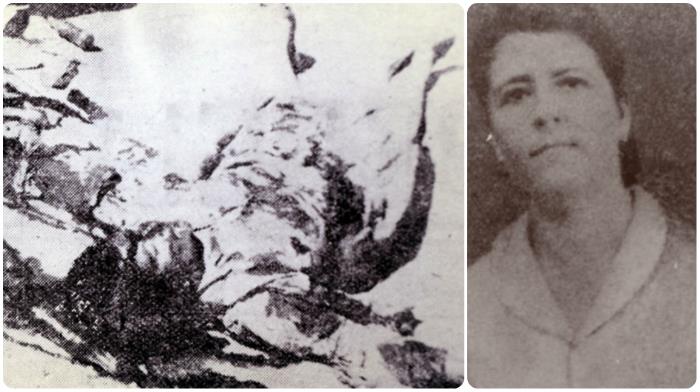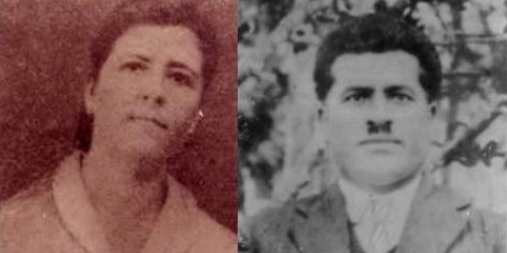He writes: Eleftheria Chr. Corridor
He was born on March 23, 1926 in the village of Avgorou in the province of Famagusta. Her parents, Christodoulos Papageorgiou and Theotera Papageorgiou, the genus Adamou. Growing up in a poor family with principles, Lucia managed to finish elementary school and then went out into the fields to help her family with the farm work. A little later, she married her fellow villager Georgios Laoutaris. They had six children, and the arrival of the seventh child was on the way. Her life has never been easy as a mother with many children.
Lucia left her mark on the EOKA struggle. Along with other women, he often carried and hid weapons, leaflets and leaflets. In her orchard in Avgorou, she and her husband maintained a hideout where the wanted guerrillas found safe haven. The summer of 1958, however, was different. It was to be her last. On July 4, 1958, the local organization of EOKA in Avgorou, following instructions, placed slogans in the village. The English took them down. Insurgency and protests prevailed. The next day the slogans were posted again. The British arrested a 15-year-old boy, Kyriakos Makris, whom they beat with batons after he refused to download the slogans. An alarm was sounded in the village. Everyone ran to the sound of the bell. Lucia was not left out. At that moment, she bathed her little daughter Theodora. The duty and the homeland called her. She kissed and hugged her daughter tightly. He handed her over to her husband's sister and ran to catch up. There in the village square, together with other women, they fought their own battle to defend the child and the homeland. They rushed to the English, snatched the child and fled. The British surrounded the crowd and launched an attack on the unarmed. A bullet from them found Lucia in the head, while a second found her fellow villager Panagiotis Zacharias. The deaths of both were instantaneous.
This was Lucia Papageorgiou Laoutari. Hero of EOKA. A mother of many children, who put her love for the homeland above her children and sacrificed herself. Her own grave in Avgorou is one of the two that they desecrated some some the day before yesterday, while her memorial service will be held tomorrow.
Always willing to help
Loukia Georgiou is the granddaughter of Loukia Papageorgiou Laoutari. Daughter of the youngest daughter of the fighter. The child who was kissed by his mother for the last time before her sacrifice. She never met her grandmother, but she met her through her actions, family photos, books, and her mother's stories. She grew up having her as a role model. He took from her the supplies that would accompany her for a lifetime. Values, ideals, principles and dreams. Lucia spoke to "F" about her heroine grandmother.
It's the first time you've talked about your grandmother. How did your mother "get to know" her?
My grandmother was a young woman full of kindness. Always willing to help anyone who needed it, without thinking about the risk. Together with my grandfather, they secretly hosted EOKA fighters in their little house in the orchard. They were a very loving couple, they were married out of love and they were a very loving mother of six.
What my mother felt was the upset her mother conveyed to her, because as she bathed her, she left her in the middle to see what was happening outside, something that had never happened before, and so she was surprised. He remembers taking her out of the bathroom and running to save a 15-year-old boy from the hands of the British along with other fellow villagers. It was the last time he saw her alive and that image of her was etched in her memory.
There is always a special relationship between mother and daughter, a bond. The mother's absence was felt at home. Who filled all the gaps left by the mother?
Unfortunately, the loss of a mother in a home leaves a big and unfilled gap. The death of her grandmother at such a young age - she was only 34 years old - turned the lives of all members of the family upside down. My grandfather went through a very strong shock, after one day he became widowed and had to raise six young children. Then there were other times, there was poverty and it had to work, so how could it combine work and raising babies? Then he thought of sending my mother and one of his sons to the orphanage in Athens, his young daughter who was only 2 years old for adoption and kept with him one of his sons and two of his daughters who were ill with Mediterranean anemia. Unfortunately, the two sick girls died shortly after their mother's death. When he was shocked by the shock, my grandfather took his two children from an orphanage in Athens, but no matter how much he wanted to take his little daughter, whom he gave for adoption to a childless couple from Nicosia, he did not succeed, because legally he couldn't do it. So, as you can see, my grandmother's death played a catalytic role in everyone's lives and was a very traumatic event for the family. My grandfather never remarried.
"We need to remind young people of the facts"
Lucia's struggle and sacrifice was a source of inspiration for Mrs. Claire Angelidou to write a poem about your grandmother. Later, George Theofanous set it to music and Marinella performed it with her unique voice. Listening to this song, what did you feel and what thoughts did you have?
I feel mixed feelings listening to this song. I feel great emotion and pride because I had a grandmother who was a heroine, but on the other hand I also feel a lot of sadness because while I had such a great grandmother, I was not lucky enough to meet her, to take me in her arms, to tell me a fairy tale and to do all these nice things grandparents do.
How often do you talk to your children about your heroine grandmother and how did they react the first time they heard the story?
My children are too young to fully understand history. I explain the facts to them in very simple words, usually when we are getting ready to go to her memorial service. The first time they looked me in the eye and listened to me carefully as if I were telling them a fairy tale. They know I got my name from my grandmother.
Do you feel that our society today knows enough about the struggle of Cypriot women who fought and sacrificed for the freedom of our homeland, or has this struggle and their contribution been forgotten?
Older people for the most part certainly know about women's contribution to the 1955-1959 struggle, but we need to remind young people of these facts, because they do tend to be forgotten along with a general trend of moral values crisis. prevails in our society.

